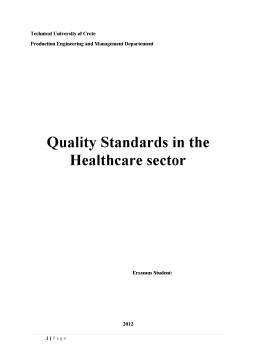Cuprins
- I. Why special quality standards are needed in the healthcare industry? 3
- II. Give the main different approached in these quality standards. 4
- Statistical Quality Control (SQC) 6
- Total Quality Management (TQM) 7
- ISO-9000 Series of Quality Standards 7
- Malcom Baldrige National Quality Award 7
- Six Sigma Approach to Quality Management 8
- III. Describe the main principles and characteristics of these quality standards 8
- IV. Give the most importance benefits. 13
- V. How it is related to TQM and typical ISO 9000 standards? 14
- VI. Which are the results from the implementation of such a standard? 15
- Example: 15
- Areas of Improvement at the Municipal Hospital of Pascani city 17
- VII. Conclusion 18
- VIII. Bibliography 18
Extras din proiect
I. Why special quality standards are needed in the healthcare industry?
The healthcare industry is like any other industry: success is identified by how well an organization manages its resources, how successful that organization is in meeting the goals it sets, and how the organization compare to its competitors. The difference between a healthcare organization that represents quality and a competitor is the bottom line. The bottom line in healthcare is measured by life and death. Quality healthcare management results in healthier patients.
In the healthcare industry, quality of care is more than a concept. It has become essential to patient well-being and financial survival.
Health services include a wide variety of quality aspects, all of which are important. In the case of medical services, the seller is doctors, hospitals, nursing homes, clinics, etc. because they offer health services for sale as stipulated prices. The buyer is the client or patient who buys these health services at the stipulated prices. It may also included quality of performance that is directly connected and closely related to healthcare such as food, housing, safety, security, attitude of employees, and other factors that arise in connection with hospitals and nursing homes. So, the time takes in to the fix an appointment, delay time, services time, timing with regard to medical treatment and surgery.
• Quality of administration and management
• Quality of doctors
• Quality of hospital care
Improvements in medical quality cannot be achieved with just one or actions alone. An inclusive approach is required that combines a number of different aspects. Systematically, there is a need for efforts at each of different levels, namely the resources introduced, the system structure and the results produced. With respect to resources, for example, what is essential includes a licensing system to secure excellent medical technicians, a system of authorizing medicines, equipment and facilities, a guideline and a critical path for standardizing and ensuring the output and measurement of the medical care results at the end to make use of the findings for improvements in medical care.
There are some different conceptions of quality management systems development throughout the world at present. The ISO conception is looked upon basic one from the point of Healthcare Institution. This conception is based on voluntary implementation of requirements and recommendations included into a special set of international ISO 9000 standards. The last version of these standards was issued at the end of 2000 year. These standards are generic – it means they can be introduced in each organization regardless its size and products or services offered to customers. An effective implementation of these standards has been already proved. These standards are recognized around the world and their principal meaning is in fact that they can lead the organizations to higher effectiveness and efficiency of their management systems on basis of common .
The public has become more aware of the role quality of care plays in healthcare. The definition has not changed, but the public and the industry’s awareness certainly has. High-profile patient safety failures have had a profound impact on the evolution of the public’s awareness of quality of care. Patient safety plays an important role in quality performance, but it is important to note that quality and safety are not the same thing. Patient safety is a subset of the larger, much more complex and multidimensional concept of quality. Highly publicized patient care failures, however, were the catalysts that prompted a national evaluation of the patient safety issues troubling healthcare.
II. Give the main different approached in these quality standards.
There is increased interest around the world in evaluation of healthcare, coming not only from governments, but also providers and consumers. Because all countries face the problem of scarce resources for health, increasing attention is being focused worldwide on the health impacts and results that are achieved with those healthcare resources. Health sector reform processes have given further impetus to ensuring accountability in the health sector and to developing the steering role of Ministries of Health, particularly with respect to the government’s role as steward and protector of the public’s health.
Through regulatory approaches, governments establish expectations for the competence of healthcare providers and institutions and for the quality of services these provide. Regulators of quality may define specific standards and require that health providers comply, but they can also allow healthcare or professional organizations to prescribe their own rules. Regulators can simply specify that standards are to be used and that those standards be formulated and applied through an acceptable process. How prescriptive is the quality regulation depends in large part on the perceived competence of provider institutions and on regulators’ confidence that the desired ends of regulation will be achieved.
Preview document
Conținut arhivă zip
- Quality Standards in the Healthcare Sector.docx
























